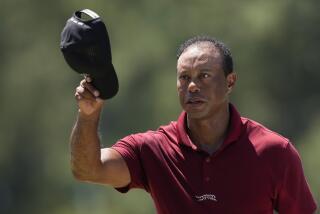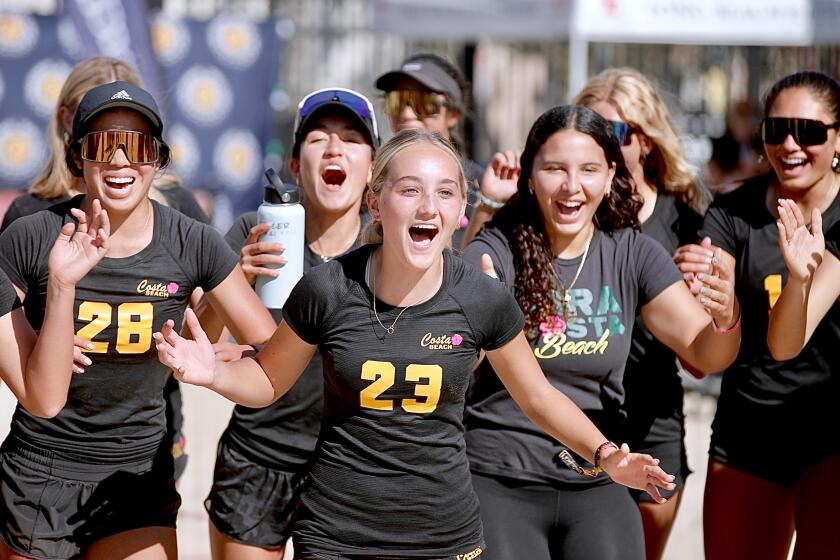Tiger Woods gets back to winning on his terms
- Share via
The golf world is a twitter, and we’re not talking about 140 characters on a keyboard.
Tiger Woods has won again. For that portion of the population that isn’t referring to flying creatures when it talks about birdies, and is not ashamed to wear white belts and loud-colored pants, that’s great news.
When the muscular man with the red shirt and receding hairline bent to pick his ball out of the cup on the 72nd hole of the prestigious Arnold Palmer Invitational at Bay Hill in Orlando, Fla., late Sunday afternoon, he dropped his shoulders noticeably. It was almost as if the weight of the world, resting there for more than two years, had been lifted.
Had the PGA Tour had a better sense for the dramatic, it would have had Michael Jordan waiting in the wings to dash out as the last putt dropped and hoist Woods’ arm in the air, declaring to the world: “He’s back!”
Woods’ last victory on the tour had been in the BMW Classic on Sept. 13, 2009. His last victory in a full-field event had been at the Australian Masters on Nov. 15, 2009.
Since he joined the tour in 1996, he had been the sport’s Reggie Jackson. Jack Nicklaus, Arnold Palmer and Gary Player were long gone and Greg Norman and Tom Watson were losing five yards a year on every club except their putters. But Woods quickly became the straw and golf fans, sponsors and TV executives were stirred.
As of Thanksgiving 2009, he had won 71 tour events. That included 14 majors, only four shy of Nicklaus’ record.
Then he became embroiled in the well-documented marital problems, crashed his car into the fire hydrant in his driveway, and seemed to be pulled under by the weight of public criticism and a suddenly failing body. Broadcaster Johnny Miller pretty much covered that territory in his four-word description Sunday: “Tiger’s fall from grace.”
Sunday’s victory ended an odyssey that could have been handled so differently had it been somebody other than Woods. It was clear, from the moment he returned to the battles at the 2010 Masters, with critics yapping at his heels and those with microphones and laptops dissecting every swing and grimace, that Woods would do it his way.
One route, oft-suggested, was for him to take it slowly, deflect the pressure from himself, laugh a little more in public, talk in his news conferences about going slowly and having reduced expectations. With that approach, he could have changed public perception from that of a jaw-set guy who slams his club down and loudly curses bad shots to one who chats up the gallery, pats TV interviewers on the back and talks about new perspectives in the wake of his woes.
But it was not to be. A warmer, fuzzier Tiger Woods is not in the DNA. It is contrary to the intensity and drive to win that is the core of his personality. Any expectation that Woods would glad-hand his way back to popularity was misguided. Vince Lombardi may have gotten credit for saying, “Winning is the only thing,” but Woods lives it.
There was never going to be any other way for Woods except to win again. That was how he would answer the critics, make them eat their words. Sunday’s victory at Bay Hill was his ideal way to keep both hands in his pocket while extending a middle finger to his doubters.
Sunday was also perfect in other ways for Woods.
He beat Graeme McDowell head to head. It was McDowell who had spoiled a previous comeback party in Woods’ own tournament, the small-field Chevron World Classic at Sherwood Country Club in late 2010. They were tied coming into the last hole, Woods hit his approach close and McDowell hit his 20 feet farther out. Even though it wasn’t an official event, winning it would squeeze some juice out of Woods’ critics.
But McDowell rolled his putt in over the top of Woods, and did the same on the first playoff hole on the same No. 18. When Woods missed his shorter putt, the smirk of critics worldwide was epidemic. “He’ll never win again,” became both an analysis and a rallying cry.
When he won last year’s Chevron event, so much time had passed between victories that comeback talk seemed less credible.
Sunday was also perfect because it was exactly 11 days until he tees it up at the Masters. That is golf’s annual big show, and now its biggest showman appears to have recovered from his stage fright.
At the 2010 Masters, only months after Woods’ “fall from grace,” none other than the chairman of Augusta National, Billy Payne, lectured Woods in a written statement on the topics of “fame, fortune and responsibility.”
Two years have gone by and the Masters is upon us again. A lot of water has passed under the bridge at Amen Corner. The public will be stoked, the other players primed, the TV audience huge and CBS downright giddy. Payne might just be first in line to greet Woods at the entrance to Magnolia Lane.
What a difference 24 months and one victory can make.
More to Read
Go beyond the scoreboard
Get the latest on L.A.'s teams in the daily Sports Report newsletter.
You may occasionally receive promotional content from the Los Angeles Times.











